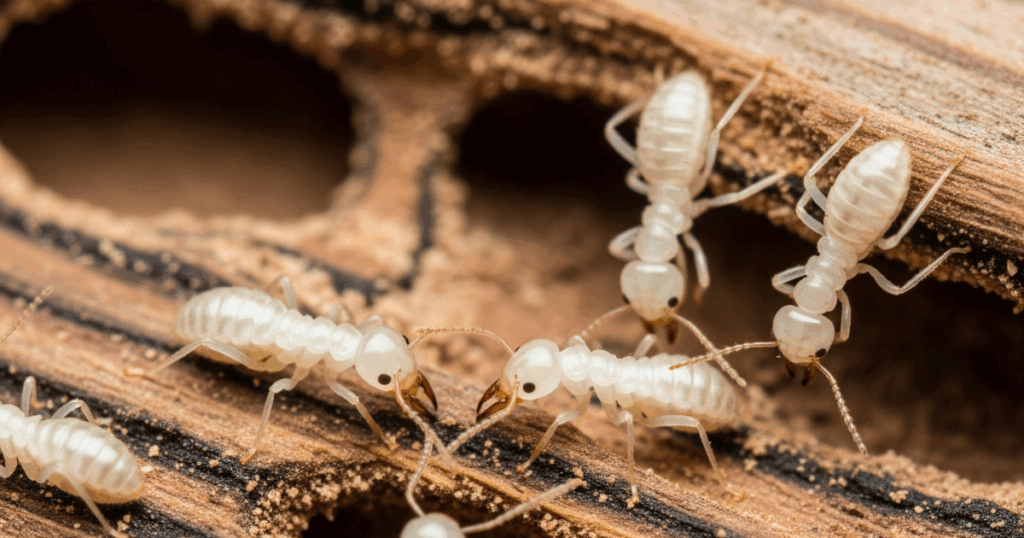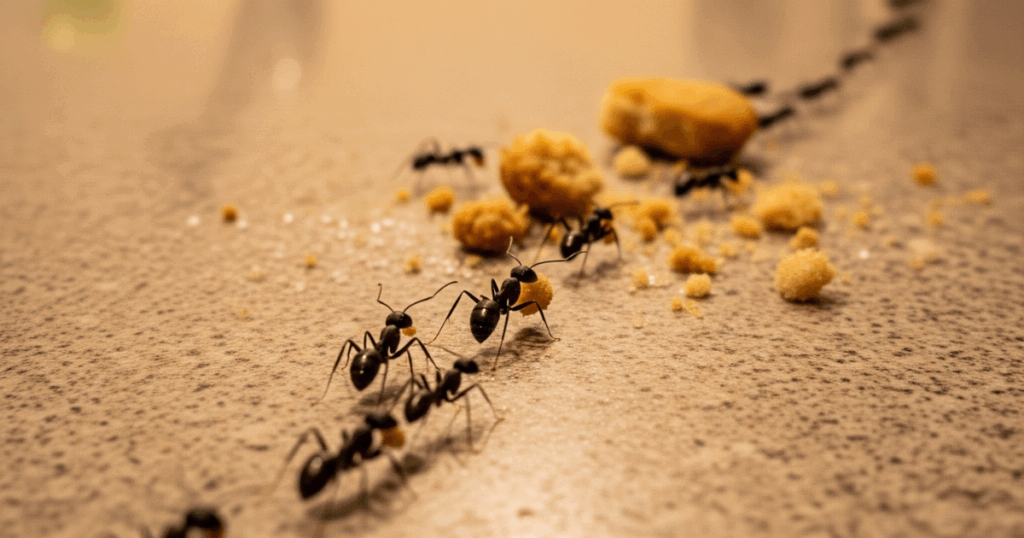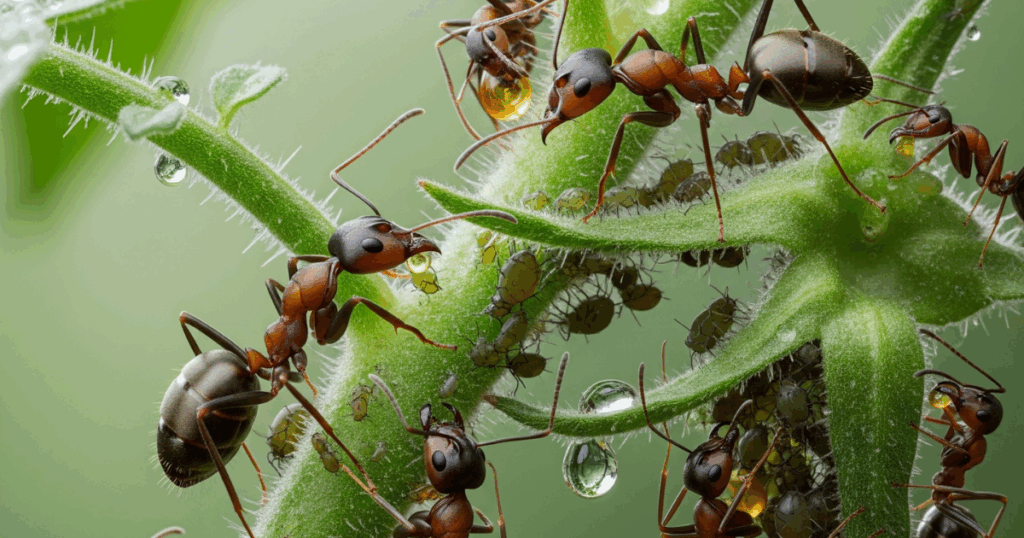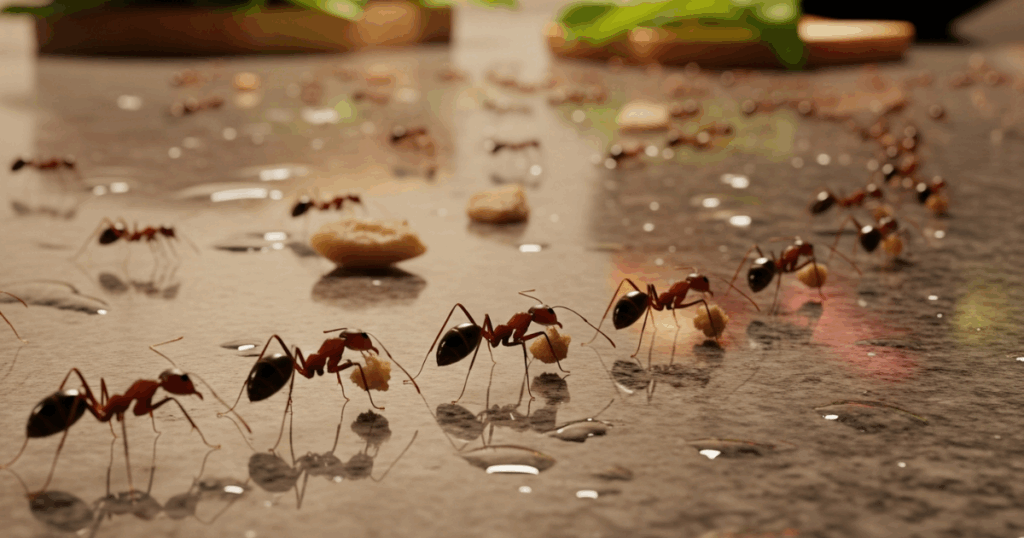While we’ve shared how to prevent rice bugs, how to get rid of wasps, and even how to get rid of ticks at home, there’s yet another common household bug you might not realize could be causing major damage: ants.
Have you ever walked into your kitchen to find tiny invaders marching across your countertops in perfect formation? If you’ve been searching for effective ways on how to stop ants, you’re not alone. Learning how to stop ants requires understanding their behavior, identifying entry points, and implementing targeted elimination strategies.
The frustration of dealing with persistent ant colonies drives millions of homeowners to seek reliable solutions for how to stop ants permanently. Whether you’re dealing with sugar ants in your pantry or carpenter ants damaging your property, mastering how to stop ants effectively can save you time, money, and endless frustration.
Table of Contents
Understanding Why Ants Invade and How to Stop Ants?
Before delving into how to stop ants, understanding their motives helps you tailor the most effective defense. Ants invade homes in search of food, water, and shelter. They enter through the tiniest cracks, drawn by crumbs, sweet items, and even houseplants. Different ant species may prefer different foods and nesting sites. For example, black ants and red ants tend to build nests outdoors but forage indoors, while white ants (termites) attack wood and cellulose-based material.
- Ants are attracted by: Unsealed food, crumbs, sugary spills, pet food, and moisture.
- Common entry points: Baseboards, wall cracks, gaps around windows and doors.
- Favored locations: Kitchens, bathrooms, around plants, beneath appliances.
Recognizing what lures ants in helps you block their access and remove what attracts them in the first place.
How to Stop Ants?
To stop ants, focus on eliminating their access to food and water, sealing entry points, and using natural or chemical repellents. Cleaning up spills, storing food properly, and eliminating standing water are crucial. Seal cracks and crevices, and consider using ant baits, diatomaceous earth, or essential oils like peppermint to deter them.
Here’s a more detailed breakdown:
1. Eliminate Food and Water Sources:
- Cleanliness: Regularly wipe down counters, floors, and other surfaces to remove crumbs and spills. Clean pet bowls and store pet food in airtight containers.
- Proper Food Storage: Store food, especially sweets, in sealed containers or in the refrigerator. Secure garbage cans and clean them regularly.
- Address Leaks: Fix any leaky pipes or faucets to eliminate a water source for ants.
2. Seal Entry Points:
- Inspect and Seal: Check for cracks and crevices around windows, doors, pipes, and foundations. Seal these with caulk or other appropriate materials.
- Landscaping: Maintain a clear space between your house and any vegetation, as plants can act as bridges for ants.
3. Use Repellents and Baits:
- Natural Repellents: Vinegar, lemon juice, peppermint oil, cinnamon, and other strong-smelling substances can deter ants. You can wipe down surfaces with a vinegar solution or place lemon peels near entry points.
- Ant Baits: Place ant baits in areas where you see ants. These baits contain a sweet substance that attracts ants, and the poison within the bait will kill them and potentially the colony.
- Diatomaceous Earth: Food-grade diatomaceous earth can be sprinkled along ant trails. It dehydrates and kills ants.
- Essential Oils: Peppermint, tea tree, and eucalyptus oils can be used to deter ants. You can use them in a diffuser or create a spray solution.
4. Consider Professional Help:
If you have a persistent or large ant problem, consider contacting a pest control professional for assistance. By implementing these strategies, you can effectively get rid of ants and prevent them from returning.
Looking for kitchen pest solutions? Read our blog on how to remove ants from rice safely.
Understanding Different Types of Ant Problems
Effective ant control begins with proper identification of the species you’re dealing with. Different ant types require specific approaches, and what works for one species may prove ineffective against another. Common household ants include sugar ants, carpenter ants, pharaoh ants, and pavement ants, each with distinct behaviors and preferences.
Sugar ants, also known as little black ants, are attracted to sweet substances and moisture. They typically enter homes through small cracks and establish trails leading to food sources. Carpenter ants, on the other hand, don’t eat wood but tunnel through it to create nests, potentially causing structural damage. Fire ants vs red ants are aggressive species that can deliver painful stings and quickly establish large outdoor colonies.
Understanding how to stop white ants (termites) requires different strategies since these aren’t true ants but rather wood-destroying insects that can cause extensive property damage. White ants feed on cellulose materials and thrive in moist environments, making them particularly destructive to wooden structures and furniture.
| Ant Type | Attraction | Common Locations | Preferred Treatment |
| Sugar Ants | Sweet foods, moisture | Kitchen, pantry | Borax-sugar baits |
| Carpenter Ants | Wood, moisture | Walls, beams, decks | Professional treatment |
| Fire Ants | Proteins, oils | Outdoor areas, lawns | Broadcast treatments |
| Pharaoh Ants | Warm areas, sweets | Hospitals, apartments | Gel baits |
| Pavement Ants | Greasy foods | Driveways, foundations | Perimeter sprays |
The key to successful ant elimination lies in targeting the entire colony, not just the visible workers. Most DIY attempts fail because they only kill the ants you can see, while the queen and remaining colony members continue reproducing and foraging for food.
How to Stop Ants from Coming in the House?

Stopping ants from entering your house demands proactive prevention and immediate action at entry points. Ensure your home isn’t appealing to ants, and they’ll look elsewhere for food.
Key Prevention Tactics
- Seal Cracks and Gaps: Inspect doors, windows, and walls. Seal visible gaps with caulk or weather stripping to stop ants from coming in the house.
- Keep Surfaces Immaculate: Clean crumbs and spills swiftly. Ants leave scent trails for others to follow, so wiping surfaces with vinegar or detergent disrupts these chemical signals.
- Remove Temptations: Store sugar, honey, syrup, and baked goods in airtight containers. Never leave food uncovered, even for short periods.
| Entry Point | Prevention Technique | Frequency |
| Door/Window gaps | Caulk, weather-strip | Inspect monthly |
| Wall cracks | Patch with filler | Twice/yearly |
| Floors/countertops | Clean with vinegar or soap | Daily |
“Struggling with fire ant mounds? Find out exactly How to Get Rid of Fire Ants fast.”
How to Stop Ants in the Kitchen, Living-room and Bathroom?

Ants don’t discriminate, they’ll invade wherever opportunity knocks. To stop ants in your home, apply these tailored strategies in key rooms.
How to Stop Small Ants in the Kitchen and Ants from Getting into Sugar?
- Counter Control: Clean after every meal. Wipe surfaces with a vinegar or soapy solution to obliterate scent trails.
- Containerize Everything: Sugars, cereals, and snacks should be in tightly sealed cans or jars. This not only stops ants in the kitchen, but blocks entry to their favorite food source.
- Immediate Spill Management: Even a single drop of juice can attract dozens of ants. Swiftly mop up all spills.
- Garbage Vigilance: Empty trash bins daily and rinse recycling containers before putting them inside.
| Ant Problem Location | Action Item | Additional Tip |
| Around sugar and sweets | Transfer to airtight containers | Keep off countertops |
| Sink, moist areas | Dry surfaces, fix leaks | Use baking soda in drains |
| Trash bins | Take out daily | Rinse bin after use |
- Vacuum Frequently: Ants are attracted to food residue left on floors or between couch cushions.
- Restrict Pet Food Access: Don’t leave pet bowls out overnight; clean them after each meal.
Bathrooms
Eliminate Moisture: Wipe sinks and showers dry. Fix any plumbing leaks immediately; ants need water to survive indoors.
How to Stop Ants Home Remedy? – Natural and Chemical-Free Methods
Looking for chemical-free approaches? Several home remedies can help stop ants, fast and without risk to kids, pets, or plants.
Top Home Remedies to Stop Ants
- White Vinegar: Mix equal parts water and white vinegar. Spray entry points, countertops, and along ant trails; vinegar destroys scent trails and deters re-entry.
- Peppermint or Citrus Oil Spray: Ants find strong scents like peppermint, orange, or lemon oil overwhelming. Mix 10–20 drops of oil in water; spray areas where ants appear.
- Chalk and Baby Powder: Drawing lines of chalk or sprinkling talcum powder near windows or doorways disrupts ants’ navigation and deters entry.
- Salt, Bay Leaves, Cinnamon: Scatter these along ant paths; the strong smell confuses ants and makes entry less appealing.
- Coffee Grounds: Used coffee grounds sprinkled along problem areas act as a natural repellent and are safe for pets.
- Diatomaceous Earth (Food-Grade): Sprinkle a fine layer around entry points, this dries out and kills ants physically, without chemicals.
| Home Remedy | How to Use | Bonus Benefit |
| White vinegar spray | Spray daily on ant trails | Eco-friendly, cheap |
| Essential oils | 10–20 drops in water, spray entrances | Pleasant lingering scent |
| Chalk/baby powder | Draw lines, sprinkle around cracks or gaps | Easy, immediate deterrent |
| Cinnamon/bay leaves | Put along window sills, baseboards | Natural and aromatic |
| Coffee grounds | Scatter outdoors, near plants or kitchen doors | Soil fertilizer |
| Diatomaceous earth | Thin layer around suspected nests or entryways | Pet-safe, non-toxic |
How to Stop Ants from Plants?

Ants frequently infest flowerpots or vegetable beds, feeding off nectar, aphids, and other insects on your plants. Here are the most effective ways to stop ants from plants and potted soil.
- Vinegar or Soap Water Spray: Gently spray into the soil or around pots to repel and discourage nesting.
- Cinnamon Powder: Sprinkle over soil or the base to confuse and repel ants. Bonus: Cinnamon can also deter mosquitoes and gnats.
- Coffee Grounds: Place in plant pots or garden beds. This keeps ants at bay while enriching soil.
- Physical Collars: Wrap a collar (paper or sticky tape) smeared with a non-toxic sticky substance around stems or pot bases, trapping any ants attempting to climb up.
| Plant Problem | Solution | Application Frequency |
| Ants in plant soil | Soap or vinegar spray | Weekly or as needed |
| Ants climbing plant stems | Cinnamon, coffee grounds | Top up every 3 days |
| Persistent ant trails | Diatomaceous earth | Biweekly |
How to Stop Ants Getting Into Sugar and Pantry Staples?
Nothing is more irritating than discovering ants in your sugar bowl or pantry. They’re specifically attracted to sweet, carbohydrate-rich foods.
- Airtight Storage: Place all sugar, syrups, cookies, and candies in sealed, ant-proof containers.
- Clean Spills Fast: Even a dusting of sugar is enough for ants to notice, clean up immediately.
- Block Entry Points: Seal cracks or gaps around pantry shelves, cupboards, and kitchen walls.
How to Stop Red Ants and How to Stop Black Ants (and White Ants)?

Red ants (fire ants) and black ants (sugar/house ants) have different behaviors and require slightly different approaches. White ants, often referring to termites, require urgent attention due to their destructive power.
How to Stop Red Ants?
- Destroy the Colony: The only way to truly stop red ants is to eliminate the colony, particularly the queen. Pouring boiling water or white vinegar into ant nests is effective outdoors.
- Bait and Remove: Use boric acid or borax mixed with sugar to create irresistible bait. Ants take it to the colony, eradicating both workers and the queen.
- Natural Deterrents: Sprinkle cinnamon or black pepper at entry points; red ants dislike strong spices.
How to Stop Black Ants in House?
- Baiting: Sweet baits (borax and sugar gel) placed near ant trails lure black ants. They transport the bait home, eliminating the colony.
- Citrus Peels and Essential Oils: Both disrupt ant scent trails and prevent further invasions.
- Keep Floors Pristine: Ants thrive on even the smallest crumbs, so regular vacuuming and mopping are vital.
| Ant Type | Top Remedy | House-Safe? |
| Red ants | Vinegar/boiling water to nests, baits | Yes |
| Black ants | Borax sugar bait, strong scents | Yes |
| White ants (termites) | Diatomaceous earth, neem oil, lemon-vinegar spray | Yes |
How to Stop White Ants (Termites)?
- Diatomaceous Earth: Sprinkle wherever white ants are seen or where wood is threatened.
- Lemon Juice & Vinegar Mix: Inject into suspected mud holes or apply to affected wood. Repeat several days for effectiveness.
- Neem Oil: Prevents reproduction, ideal for persistent termite problems. Apply to wood or garden structures.
How to Stop Ants from Coming in the Kitchen? (and How to Stop Them from Coming Back)
Kitchens and pantries are favorite haunts for ants due to food availability. To stop ants from coming in your kitchen, combine these steps with ongoing vigilance:
- Seal All Entry Points: Pay special attention to where pipes or wires enter the house. Use silicone caulk for a precise seal.
- Create Natural Barriers: Lay lines of salt, cinnamon, or bay leaves at windows, door sills, and worktops.
- Clean Up After Cooking: Wipe counters with a vinegar solution, and never leave dirty dishes overnight.
- Regular Garbage Disposal: Take out the trash daily.
- Limit Attractions: Store leftover food and snacks immediately after meals.
To stop ants from coming back, repeat these strategies, keep a regular cleaning schedule, and stay alert to new trails. Consistency is key: ants are persistent but can be outwitted!
| How to Stop Ants(Steps) | Why It Works | How Often |
| Clean up and sanitize | Removes food and scent trails | Daily |
| Store food properly | Prevents access to foods ants want | Ongoing |
| Seal entry points | Blocks new infestations | As needed |
| Apply home remedies | Ants avoid treated or barrier areas | Weekly or as needed |
Conclusion
Stopping ants isn’t just about reacting; it’s about prevention, sealing, and vigilance. Whether you need to know how to stop ants in your home, kitchen, or garden, or how to stop red ants, black ants, or even white ants, the principle remains the same: deny them food, block their entry, break their scent trails, and keep your environment clean. Combining airtight storage, sealing up cracks, regular cleaning, and applying home remedies puts you firmly in control. Let these strategies become routine, and soon, ants will see your home as off limits.
Seeking professional pest control services represents an excellent decision for homeowners serious about achieving complete ant elimination.For comprehensive and hassle-free Ants removal and long-term pest prevention, trust the professionals at Antipest Office. Visit us at the Antipest Office, Our trained technicians use safe and effective methods to protect your home and business. For service bookings and consultations, call us at +91 9819018398.“Got ants in your car too? Reclaim your drive, take action now to get rid of ants in car and keep every ride comfortable and pest‑free.
How to Stop Ants? – FAQs
How to stop ants from coming into the house?
Seal cracks, keep surfaces clean, and use natural repellents near entry points to prevent ants from entering your house.
What are simple ways on how to stop ants from entering my home?
To stop ants from entering your home, seal entry points and keep surfaces clean of food crumbs. Regularly wiping areas with vinegar can also deter ants.
How to stop ants from coming into the kitchen?
Clean up spills immediately and store food in airtight containers to stop ants from coming into the kitchen. Use lemon juice or ant repellents around entry points.
How to stop ants from returning after removal?
After removal, clean surfaces with soapy water to erase scent trails and keep food sealed to stop ants from returning. Regular inspection for new entryways is also important.
Can natural remedies help on how to stop ants in the house?
Yes, natural remedies like using vinegar, lemon juice, or diatomaceous earth can help on how to stop ants in the house. These disrupt ant trails without harsh chemicals.
Is there a fast solution for how to stop ants quickly?
A fast solution for how to stop ants is to vacuum or wipe them up and use commercial ant sprays at entry points. However, addressing the source is needed for long-lasting results.
How to stop ants from invading pet food bowls?
Create a moat by placing the pet food bowl in a shallow dish of water to stop ants from reaching the food. Cleaning up spills around the bowl after each feeding also helps.
How to stop ants from plants and pots?
Use vinegar or soap water spray, cinnamon, and coffee grounds around plant bases to stop ants from plants and pots.
How to stop ants naturally without using chemicals?
You can stop ants naturally by using barriers like cinnamon, coffee grounds, or chalk at entry points. These substances disrupt their trails and repel them without chemicals.
How to stop ants from nesting in potted plants?
To stop ants from nesting in potted plants, sprinkle diatomaceous earth on the soil surface and water less frequently. Removing dead leaves and debris also deters them.

